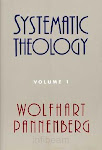This is an essay on the nature of doctrine. References are to Jaroslav Pelikan’s monographs on the development of Christian doctrine. Reference (3:241) would refer to volume 3, page 241.
1. Doctrine is “important”
2. Doctrine and mystery
3. The inadequacy of doctrine
4. The inevitability of doctrine
5. The scope of doctrine
6. “Hierarchies” of doctrine
7. The relation of words and reality
8. Liturgy as the fulfillment of doctrine
9. Love as the fulfillment of doctrine
-- -- --
The Inevitability of Doctrine
Theology has to, at the same time, shun both speculation as well as doctrinal indifference, recognize its validity and limitations. It should concentrate on the task of communication.
Or as Maximus put it, “neither to concern ourselves with those things that are above us, nor to neglect the knowledge of God, but to give to others of the things that have been granted to us” (2:31). “Reverent silence” and “obliged confession” (3:220-221), not either or.
Some doctrines, such as the Eucharist or Holy Communion, have indeed produced “curious and useless investigation” and “bizarre theories” (4:53), but – and should we say precisely because of this? – faithfull expositors of Christian doctrine could (and should) not leave the problem alone.
There has always been an undulation between a form of reflection that “seeks, through reasons based on the true faith, to understand the nature of God” and a form that “holds principally to the love of God … without lofty inquiry” (4:63), although in most thinkers (including Jean de Gerson, the author of the words just quoted) both forms are present at the same time.
So, dogma was – and is – inevitable. Restoring the “proper order between doctrine and life” is the “central duty” of the church (5:55).
It is, of course, essential to “believe in Christ” personally, not only to “believe in Christ” dogmatically; but the first can not happen properly without the second, said Simeon the New Theologian (2:257).
As regards Christ, he had to be, said Simeon, what orthodox (Chalcedonian) christology had declared him to be, for only such a Christ could serve as “the exemplar” of man’s union with God (2:259). For Luther the proper understanding of the relation between the divine and the human in the person of Christ was, “not a speculative theory, but the basis for the doctrine of Christ’s work, and thus for Christian ‘consolation’” (4:160).
“Divine dogmas,” said Adlhelm, were a means of fostering the spiritual life (3:13). And true worship, reminded Nicholas of Cusa, requires a true object of worship (4:313).
But how can one know when reflection is possible and when it is not? When should we keep silent and is keeping silent impossible?
2 years ago







No comments:
Post a Comment